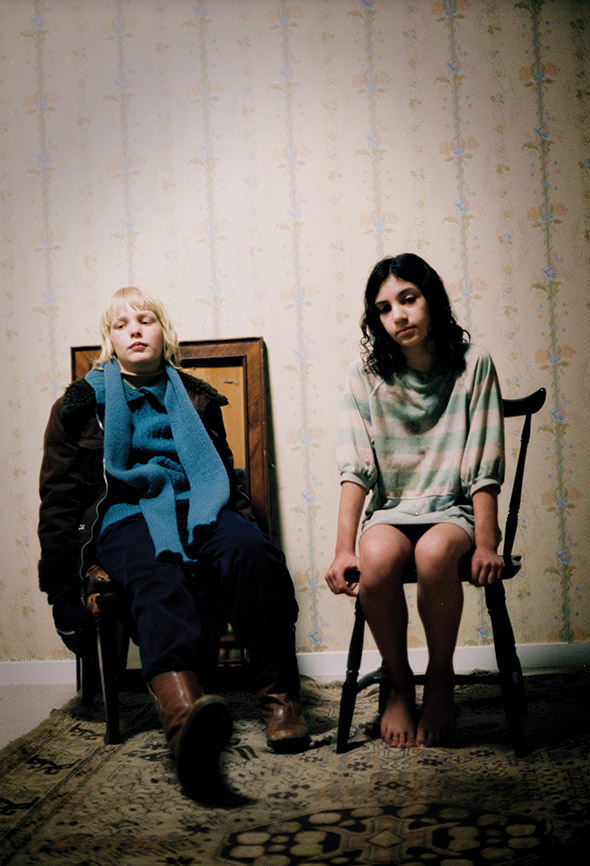
Text by Jesi Khadivi
Feeling broody? Go see a cop film. Want to sleep with your lights on for a week? Check out the latest Saw movie or any of its myriad spin-offs. There’s an appropriate film genre for whatever emotion you’re looking to elicit. Historically produced on-the-cheap to screen as opening pictures for bigger budget fare, genre films have expanded into a multi-million dollar industry with fans hungry for the next installment of their favorite superhero or slasher flick.
It wasn’t always so banal. The seminal French film magazine Cahiers du Cinema extolled the virtues of directors like Nicholas Ray (Bigger than Life/Rebel Without a Cause) and Alfred Hitchcock (Psycho/The Birds). The budding critics of Cahiers, soon to make their names as French New Wave directors in the 1960s, discovered the (not so) hidden existential poetry of the bleak film noir genre in the dark and smoky cine clubs of Paris. At its best, pulp has the uncanny ability to expose cultural zeitgeist. Noirs and detective films showed these young Frenchmen the darker side of the post-war American psyche. Despite the sea of schlock out there, the past decade’s surge in independent filmmaking has contributed to an expansion of media literacy. MTV has aped the techniques of French New Wave icon Godard for years and Quentin Tarantino, the post-modern film-mix tape-compiler himself, mines the traditions of Blaxploitation, Noir, New Wave, and Kung Fu to create the heady mélange of films like Kill Bill and Jackie Brown. The demand for intellectual genre cinema is growing. Always a step ahead of the pack, Magnolia Pictures aims to fill the educated demand for intelligent genre pictures with their Six Shooter Series, restoring the exquisitely moody, character-driven quality of the genre films of yore to the big screen.
The brain child of Tom Quinn, Magnolia’s dynamic head of acquisitions, the series was a labor of love for the production company. As its name suggests, six international films were chosen for the series: Let The Right One In (Sweden), Special (United States), Time Crimes (Spain), Donkey Punch (Britain), Eden Log (France) and Big Man in Japan (you guessed it, Japan). “Some of the most exciting, forward-thinking cinema today falls under the genre label and deserves a showcase,” says Magnolia Pictures President Eamonn Bowles. Eschewing the pyrotechnics of many Hollywood movies, the films featured in the Six Shooter series take on a more contemplative and intellectual tone without sacrificing a whit of entertainment value.
The first film in the series, the award winning Swedish vampire film, Let The Right One In, was released on October 24th in New York and Los Angeles. Receiving nearly universal critical acclaim, the surprisingly tender story of a tortured young boy and his relationship with the 12-year-old vampire next door deftly encapsulates the radical potential of this latest crop of genre pictures. It’s smart, emotive, and though the film can be graphic, it doesn’t rely on violence to drive the narrative. Director Tomas Alfredson revels in what he calls the “unequivocal Swedishness” of his film, depicting the trauma of adolescence and the sensuality of violence with a rigorous attention to detail.
Les, the self-loathing, comic book obsessed traffic cop in Hal Haberman & Jeremy Passmore’s film Special, becomes convinced he is a super hero after participating in a clinical trial for “Specioprin Hydrochloride,” a drug intended to curtail the chemicals that produce self-doubt. He stalks through anonymous streets and alleyways in Los Angeles, attacking innocent people that he imagines have committed crimes. Keeping with Magnolia’s unorthodox distribution methods, Special premiered as a VOD (video on demand) on HD Net in early November prior to its theatrical release later that month (Back in 2006, Steven Soderbergh’s film Bubble was released simultaneously on DVD, HDTV and in the theaters).
While the time-traveling premise of the Spanish thriller, Time Crimes (dir. Nacho Vigalondo), is fantastical, the scariest and most compelling moments in the film come from the small, psychological gestures. Who knew that a man with a pink bandage-wrapped head miming holding a pair of binoculars could be so terrifying?
The new year will bring the British slasher-thriller Donkey Punch (dir. Oliver Blackburn), a story about seven Euro party animals forced to duke it out after a freak death on a party yacht in the Mediterranean. In February, Eden Log (dir. Franck Vestiel), a French sci-fi horror flick about a man who awakens in a cave to find himself pursued by a mysterious monster will be released. Big Man Japan (dir. Hitoshi Matsumoto) followed in March, is the funniest film of the bunch; a kitschy, super hero film in the tradition of Asian slapstick like Kung-Fu Hustle. Like many of the films in the series, Big Man conflates the fantastical and the everyday. “It’s a mock doc about an ordinary Japanese man who will hop into purple underpants to battle Godzilla-type monsters,” Quinn explains.
With Let the Right One In and Time Crimes garnering rave reviews (both are already slated for English language remakes), things are looking good for the Six Shooter Series. While online film critics and Fantastic Festival patrons started the buzz, many of the films in the series are finding cross-over success in the art film market. Is another series from Magnolia/Magnet in the works? “If we can find the films, we’ll do it,” Quinn laughs, “but we’re not limited to six. We could do the Five Furious Fingers of Film. Or the Seven Samurai of Cinema.”

